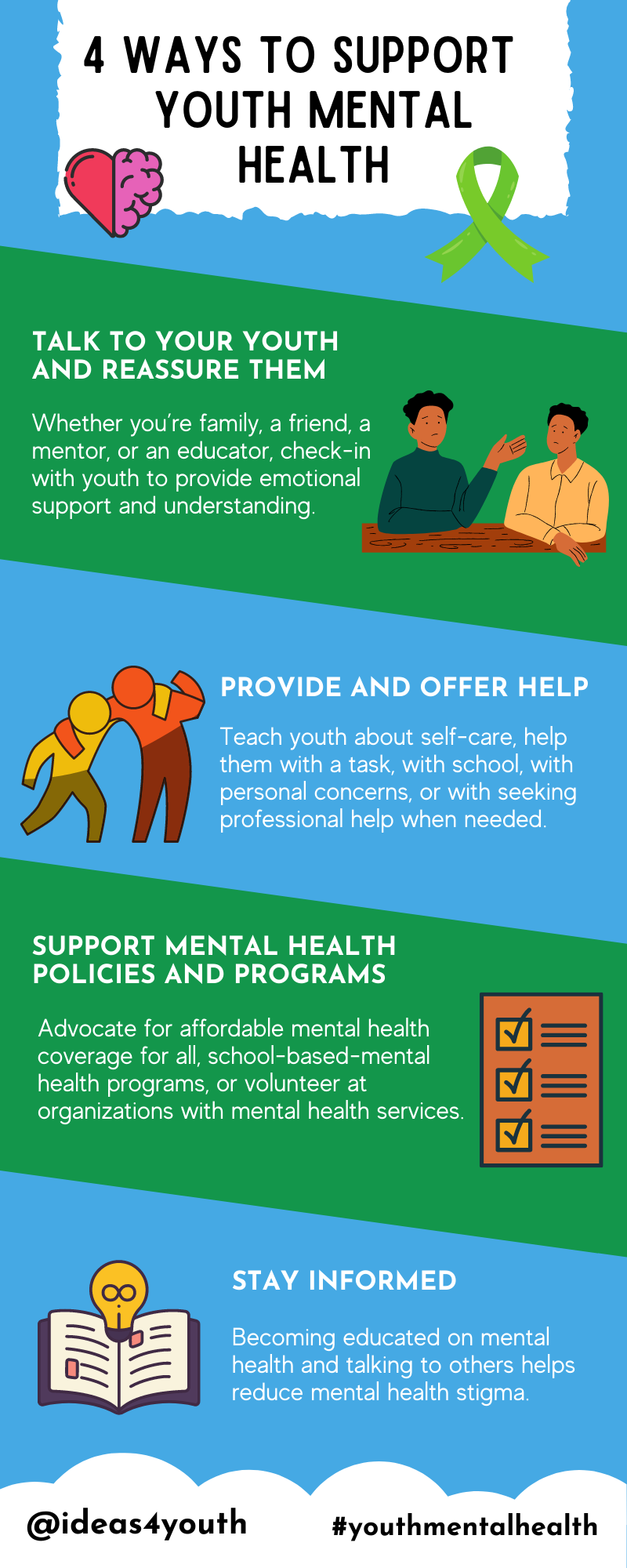
Think back to when you were a child, a teenager, or both. You may not want to remember, I certainly don’t, or maybe you are remembering right now, but try to truly remember how it was. Were you happy overall? Was it hard? Or was it a mix of both? Did you wish you had someone to talk to? A friend? A family member? A teacher? A counselor? Did you wish you were not always sad, anxious, stressed, alone, drained, or afraid? That someone would tell you it’s okay to ask for help even when the culture you grew up in said otherwise? I am currently 25, and growing up, especially as a teen, it felt as if I was constantly drowning until finally, I learned how to swim. Since then, I have sought help for my mental health whenever I needed it. My mentors and counselors have been my lifeguards when I become too tired to swim, but this is not about me. It’s about those who are still drowning. Who have drowned. Who need our support and to be a lifeguard.
This is about the 1.8 million youth diagnosed with depression who, according to Mental Health America, did not receive any mental health treatment in 2020. This is about the 24% and 31% increase in emergency room visits for mental health-related reasons for children ages 5-11 and 12-17 respectively, as reported by the CDC in 2020. This is about all the youth who feel they may not be able to ask for help or know where to turn to. Whether you are family, a friend, a teacher, or someone who cares for our young ones, our youth need us to be aware of mental health issues and know how to support them.
 Mental health, to put it simply, describes the social and emotional well-being of someone and the capacity to be able to cope with life’s demands. Youth are in an important period of physical and mental growth. Supporting healthy mental growth helps them develop healthy relationships, adapt to challenges, perform better in school, manage emotions, and solve problems. According to the World Health Organization (WHO), many factors can influence mental health, such as the quality of home life, relationships with peers, and environmental conditions. If the factors that negatively impact mental health are not addressed, it can create or worsen existing mental health issues.
Mental health, to put it simply, describes the social and emotional well-being of someone and the capacity to be able to cope with life’s demands. Youth are in an important period of physical and mental growth. Supporting healthy mental growth helps them develop healthy relationships, adapt to challenges, perform better in school, manage emotions, and solve problems. According to the World Health Organization (WHO), many factors can influence mental health, such as the quality of home life, relationships with peers, and environmental conditions. If the factors that negatively impact mental health are not addressed, it can create or worsen existing mental health issues.
Currently, one of these factors is the COVID-19 pandemic. It’s no secret that the COVID-19 pandemic has impacted every aspect of life and the world; this includes mental health, especially for our youth. It’s enough of an impact that the U.S. Surgeon General Vivek Murthy issued an advisory that the COVID-19 pandemic further exposed the youth mental health crisis. Mental health is further negatively impacting our LGBTQ+ youth. The Trevor Project reports that 70% of LGBTQ youth stated that their mental health was “poor” most of the time or during COVID-19. Our youth of color also face extra challenges in accessing quality mental health care and support. With everything going on, you might be asking yourself, what can we do?
We can do a good amount, actually. There are ways to learn, advocate, and support youth and their mental health, and by reading this blog you are already a step to help address our mental health crisis. Before I list some ways to help youth, I understand that mental health affects everyone globally, but since I am in the U.S. and for the sake of time and clarity, the information and resources will mostly apply to the U.S. Still, anyone, anywhere can use the following information and resources as they see fit.
 One of the ways to support mental health starts with the individual person. If you are a young person needing someone to talk to, please find a trusted adult. Check out this list of resources for mental health specific to youth and practice self-care. If you are an adult, be a positive role model. Vote for mental health policies, support organizations and agencies that provide mental health services, and encourage schools to provide mental health services and trainings to create welcoming environments.
One of the ways to support mental health starts with the individual person. If you are a young person needing someone to talk to, please find a trusted adult. Check out this list of resources for mental health specific to youth and practice self-care. If you are an adult, be a positive role model. Vote for mental health policies, support organizations and agencies that provide mental health services, and encourage schools to provide mental health services and trainings to create welcoming environments.
 For families, first and foremost, you know your child best, but sometimes they need some encouragement and reassurance that they can talk about their feelings and experiences. Talk to your child, spend some time with them, but learn the warning signs of mental health decline and seek professional help when needed (en Español). Unicef has a website on how to talk to your child about mental health, and here’s a COVID-19 resource kit for parents/guardians.
For families, first and foremost, you know your child best, but sometimes they need some encouragement and reassurance that they can talk about their feelings and experiences. Talk to your child, spend some time with them, but learn the warning signs of mental health decline and seek professional help when needed (en Español). Unicef has a website on how to talk to your child about mental health, and here’s a COVID-19 resource kit for parents/guardians.
This information and resources are by no means a complete list, but it is a starting point. Our youth need us more than ever to not only support their physical health but their mental health as well. The COVID-19 pandemic has shed a light on the inequalities of mental health issues and services to youth. By creating awareness and providing support, they will have a better opportunity to live a happier and healthier life because every child deserves a lifeguard.
Extra Resources:
- US Surgeon General Advisory on Youth Mental Health Crisis Exposed by COVID-19 | HHS.gov
- How to support mental health for students of color



